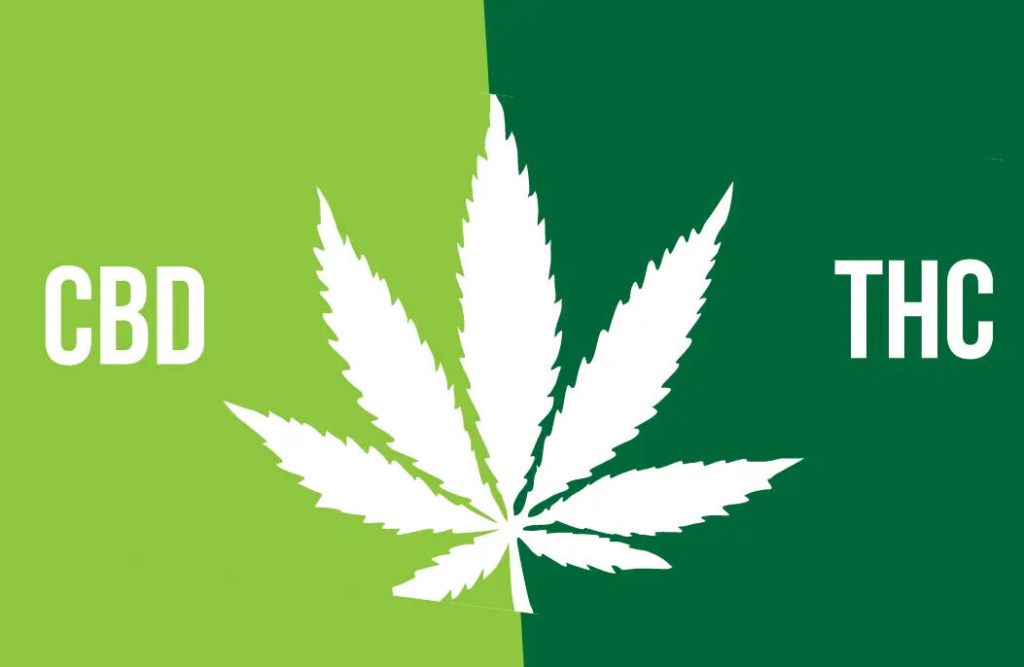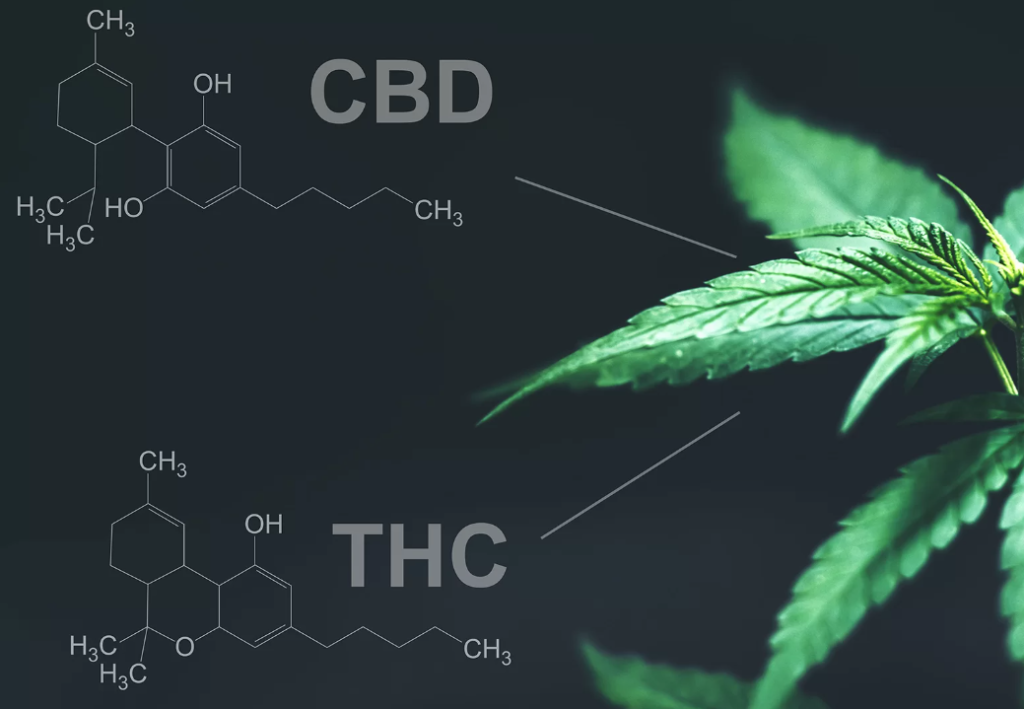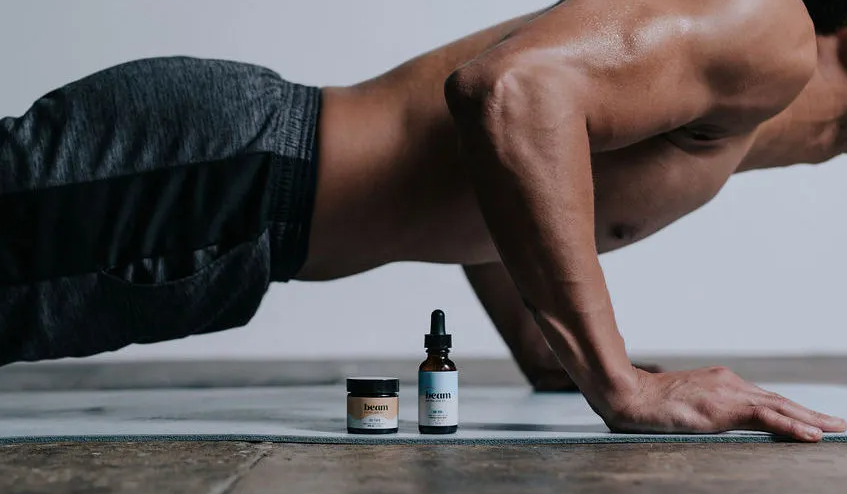In recent years, CBD and THC have gained significant attention for their potential health benefits and contrasting properties. This introductory guide aims to shed light on the differences between CBD (Cannabidiol) and THC (Tetrahydrocannabinol), their respective benefits, and common uses.
Introduction
CBD and THC, two compounds found in the cannabis plant, have become subjects of intense interest and discussion. As the world’s perception of cannabis shifts, it’s crucial to understand the distinctions between these cannabinoids and the potential advantages they offer.

What are CBD and THC?
CBD (Cannabidiol) and THC (Tetrahydrocannabinol) are both cannabinoids found in the cannabis plant. While they share the same origin, their chemical structures and effects differ significantly.
CBD is a non-psychoactive compound, meaning it doesn’t produce the “high” associated with cannabis use. In contrast, THC is psychoactive, leading to altered perceptions and euphoria when consumed.
One essential concept to understand is the entourage effect, which plays a significant role in the interaction between these cannabinoids.
The Entourage Effect: Maximizing Benefits
The entourage effect suggests that cannabinoids, terpenes, and other compounds found in the cannabis plant work together synergistically to enhance their individual effects. In the case of full-spectrum CBD products, this means that CBD is not acting alone. Instead, it’s part of a holistic blend of compounds that may amplify its benefits.
Full-spectrum CBD products contain a wide range of cannabinoids, including trace amounts of THC (usually within the legal limit of 0.3% in the United States). They also feature various terpenes, which are responsible for the plant’s aroma and have their own potential health benefits.
The idea behind the entourage effect is that these additional compounds can enhance CBD’s therapeutic properties. For example, the presence of a small amount of THC may complement CBD in managing pain and inflammation, without inducing a significant high. Similarly, terpenes like myrcene or linalool can contribute to the calming or energizing effects of a particular strain.
While full-spectrum CBD products may offer a broader range of potential benefits, it’s essential to be aware of their THC content, especially if you are subject to drug testing. Some users may prefer broad-spectrum or CBD isolate products, which contain no THC but may provide fewer compounds to work in synergy with CBD.
Understanding the entourage effect can help you make more informed choices when selecting CBD products tailored to your specific needs and preferences. Always consult with a healthcare professional for personalized recommendations.
Key Differences Between CBD and THC

CBD: Non-Psychoactive Wellness
CBD has gained popularity for its therapeutic potential. Unlike THC, it doesn’t induce mind-altering effects. This makes CBD a viable option for individuals seeking wellness benefits without the high.
THC: The Psychoactive Compound
On the other hand, THC’s psychoactive properties are well-known. It’s the primary reason behind the recreational use of cannabis. Some users seek the euphoric sensation THC provides.
Benefits of CBD
Pain Management and Inflammation
CBD has emerged as a promising option for pain relief and inflammation reduction. Studies suggest that it may interact with the endocannabinoid system to alleviate chronic pain.
Anxiety and Stress Relief
Many individuals turn to CBD for its potential to ease anxiety and stress. CBD’s interaction with receptors in the brain may help regulate mood and reduce feelings of anxiety.
Sleep Aid
CBD has also been explored as a sleep aid. Some users report improved sleep quality and duration with CBD supplementation.
Benefits of THC
Pain Relief and Euphoria
THC’s psychoactive effects often lead to feelings of euphoria, which can help users temporarily escape pain and discomfort. This is why some medical marijuana patients prefer THC-rich strains.
Nausea and Appetite Stimulation
THC has shown promise in alleviating nausea, making it valuable for individuals undergoing chemotherapy or dealing with appetite issues.
Potential Medical Uses
Research is ongoing, but THC has exhibited potential in managing various medical conditions, including epilepsy and multiple sclerosis.
Legal Status
The legal status of CBD and THC varies by location. While CBD is legal in many places and widely available in various products, THC remains illegal in some regions. Always be aware of the laws in your area.
Uses and Applications

CBD Products
CBD products have gained popularity for their versatility and potential wellness benefits. Here are common uses and applications for different CBD product types:
CBD Oils and Tinctures:
- Pain management
- Anxiety and stress relief
- Sleep aid
- General wellness and relaxation
CBD Topical Creams and Balms:
- Targeted relief for sore muscles and joints
- Skin conditions like acne or eczema
- Localized pain relief
CBD Capsules and Edibles:
- Long-lasting pain relief
- Anxiety and stress reduction
- Improved sleep quality
CBD Vape Pens and E-Liquids:
- Fast-acting relief for anxiety or panic attacks
- Managing acute pain or nausea
- Relaxation and mood enhancement
CBD Isolate Powder:
- Customized dosage control
- Mixing with beverages or food for discreet consumption
- Incorporating into skincare products
Click For Top Rated CBD Products
THC Products
THC products are often associated with recreational use, but they also have potential medical applications. Here are common uses and applications for different THC product types:
THC Flower (Buds):
- Euphoria and relaxation
- Creative stimulation
- Pain and stress relief
THC Edibles:
- Prolonged pain relief
- Enhanced mood and relaxation
- Appetite stimulation
THC Concentrates (Dabs):
- Rapid and potent pain relief
- Managing severe pain or nausea
- Quick, intense euphoria
THC Tinctures:
- Precise dosage control
- Discreet consumption
- Pain relief without smoking
THC Topical Balms:
- Localized pain relief without psychoactive effects
- Skin conditions like psoriasis or dermatitis
THC Vape Pens and Cartridges:
- Fast-acting relief for anxiety or depression
- Social or creative stimulation
- Managing chronic pain or insomnia
It’s important to note that the effects and experiences with THC products can vary significantly based on individual tolerance levels and the specific strain or product used. Medical marijuana patients often consult with healthcare professionals to determine the most appropriate THC product and dosage for their condition.
When considering the use of CBD or THC products, always start with a lower dose, especially if you’re a beginner, and consult with a healthcare provider for personalized guidance, particularly when using them for medical purposes.
Conclusion
Final thoughts, CBD and THC, the dynamic duo of cannabinoids, offer a fascinating world of possibilities. CBD, with its non-psychoactive wellness properties, has been a game-changer for individuals seeking natural relief from pain, anxiety, and sleep issues. On the other hand, THC, known for its euphoric effects, holds promise for various medical conditions and can provide a unique recreational experience.
Understanding these compounds’ differences and their potential synergy through the entourage effect empowers you to make informed decisions about which product suits your needs best. Whether you’re considering CBD for relaxation or exploring THC for creative inspiration, your journey begins with knowledge.
Remember to check local regulations, start with lower doses, and consult with a healthcare professional for personalized guidance. With the right information and responsible use, you can unlock the remarkable benefits these cannabinoids offer.
Unlocking the Potential: CBD and THC Benefits
Incorporating CBD and THC products into your wellness routine can provide a multitude of benefits, including:
- Pain Relief: CBD and THC can help manage chronic pain, providing relief and improved quality of life.
- Stress and Anxiety Reduction: Both cannabinoids have shown promise in reducing stress and anxiety levels.
- Better Sleep: CBD may enhance sleep quality, while THC can induce relaxation for a more restful night.
- Creative Inspiration: THC’s euphoric effects may spark creativity and imagination.
- Skin Health: CBD and THC topicals can address skin conditions like acne, eczema, and psoriasis.
- Appetite Stimulation: THC can be particularly helpful for those experiencing appetite loss or nausea.
By harnessing the potential of these compounds, you can improve your overall well-being and explore new dimensions of health and relaxation.
Now, armed with knowledge about CBD, THC, and their remarkable benefits, you’re ready to embark on your journey toward improved wellness and a greater understanding of these intriguing cannabinoids. Enjoy the many advantages they offer, and remember to make informed choices to optimize your experience.
FAQ Section
Q1: Can CBD get me high like THC? A1: No, CBD is non-psychoactive and does not produce a high. THC is responsible for the psychoactive effects associated with cannabis.
Q2: Are there any side effects of using CBD and THC? A2: Side effects can occur with both CBD and THC, including dry mouth, dizziness, and changes in appetite. These effects vary from person to person and depend on dosage.
Q3: Is it safe to use CBD and THC together? A3: Combining CBD and THC can be safe, but it’s essential to consider the ratio and individual tolerance levels. Some users find that CBD can mitigate the psychoactive effects of THC.
Q4: How can I choose the right CBD or THC product for my needs? A4: Selecting the right product depends on your goals. Consult with a healthcare professional and consider factors such as dosage, method of consumption, and desired effects.
Q5: Are there any legal concerns with using CBD and THC? A5: The legal status of CBD and THC varies by location. Always research and adhere to local laws and regulations regarding these compounds.
Other Articles
CBD Topical for Sore Muscles and Joints: A Comprehensive Review
Top 3 CBD Websites: A Review of the Top Choices for Premium Cannabidiol Products